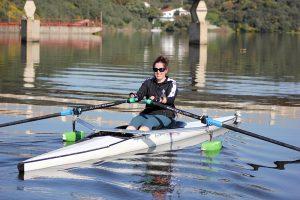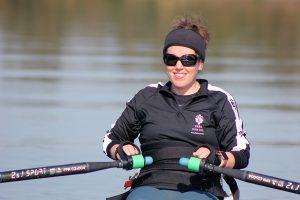Adaptive rowing athletes complete an intensive training camp in Portugal
Venturing solo to a foreign country to meet a group of unfamiliar people can be daunting, but for para rowing athlete Alanna Flax-Clark, it was an experience she won’t soon forget.
Flax-Clark, a Los Angeles resident, and a handful of other para rowing athletes spanning seven countries, recently returned from a multi-day intensive rowing camp in Avis, Portugal at the Avizaqcua Training Center as part of the Para Rowing Foundation’s (PRF) fourth intensive training experience. At age-13, Flax-Clark, who was diagnosed with a neurological disease associated with dysregulation of the central nervous system and autonomic nervous system that affects the bones, muscles, nerves, skin and blood vessels. The symptoms grew worse in early adulthood and now exhibit quadriplegia.

Over a grueling five-day span, athletes undertook a busy “mind and body” daily schedule which included two on-water rowing sessions with one-on-one coaching, two strength and conditioning and mobility sessions with a physical therapist and a series of psychology sessions and massage therapy.
Athletes visiting the center share the gym, dock and water access with able-bodied national teams currently training at the facility.
For elite para-athletes who typically lack access to this caliber of specialized support, the Intensive Training program offers an invaluable experience. Without fail, the athletes reap profound rewards in short order through their full engagement. Given that every participant has unique needs, the program ensures their specific requirements are meticulously catered to.
“We all became a family, supporting one another, cheering each other on, and talking and laughing,” says Flax-Clark. “If I ever [had] a question or wanted to chat, I know these people will be there for me from here on out.”
For Flax-Clark, a quadriplegic, gripping the oars are especially challenging. That’s why she was particularly excited to break in a pair of prototype hand-worn gloves designed to help hold and pull the oars without them falling from her hands.
“For a first try, they worked great, and we learned a lot about where they could be improved for my own comfort and practical and functional application,” says Flax-Clark. “I was able to use the grips during the entire trip for long training periods and make progress with my rowing.”

The grips are a collaboration between Flax-Clark and U.S. Paralympian and Paralympic coach Jenny Sichel and 3D printed by Mark Fuglevand, founder of Abilitease Adaptive. Fuglevand is C-6 incomplete quadriplegic who sustained the injury when he was 18 years old from a diving accident.
Flax-Clark says they’re already working on a new design based off of the results they collected during the training.
More creative ideas and designs helped other para athletes, too. Several participants had the opportunity to test a custom-designed fixed seat developed in-house by the PRF team.
And Krists Mickēvičs from Latvia, who has a right leg above-knee amputation, was impressed by the enhanced support and leverage the seat provided and ultimately went home with the very unit he had been using on the final day of training.
PRF Chair of the Board Steven Dowd, who sustained a spinal-cord injury in a 2016 cycling accident, says they’ve had a strong demand for programs like their Intensive Training one.
“We could host these sessions every few months, but such comprehensive training initiatives require significant resources to organize and execute effectively,” Dowd says. “We welcome partners and donors who want to see more of these initiatives.”
To learn more PRF, visit pararowingfoundation.org or email info@pararowingfoundation.org.